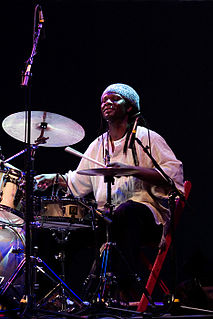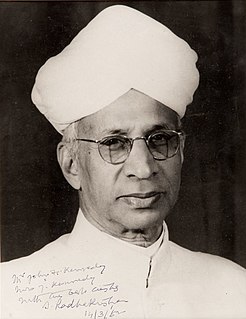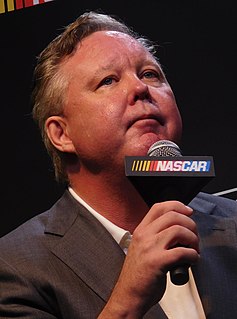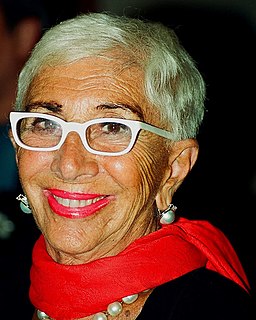A Quote by Eric Reid
You'd like to think we're past certain things, the way we treat people. I thought we were at a time where you love your neighbor as yourself. But as I've studied history - it hasn't repeated itself necessarily, but it's dressed a little different and is acting the same.
Related Quotes
We are not taught "love thy neighbor unless their skin is a different color from yours " or "love thy neighbor unless they don't make money as you do" or "love thy neighbor unless they don't share your belies." We are taught "love thy neighbor". No exceptions. We are all in this together - every single one of us. And the only way we are going to survive as a society is through compassion. A Great Community does not mean we all think the same things or do the same things. It simply means we are willing to work together and are willing to love despite our differences.
We are little animals walking on the ground, we have a certain life time, we are acting and interacting with different people, and we are trying to build things, but we are just some sort of virus compared to the entire sky. You always have to remember that the moon, the earth, the sun, they are like the real universal objects. We are just passing by, and it makes life more beautiful to think that way. More relaxing to think that way, that nothing is really important, because you give yourself much more confidence and you forgive yourself more things when you think about that.
There is a stage you reach, Deagle thinks, a time somewhere in early middle age, when your past ceases to be about yourself. Your connection to your former life is like a dream or delirium, and that person who you once were is merely a fond acquaintance, or a beloved character from a storybook. This is how memory becomes nostalgia. They are two very different things - the same way that a person is different from a photograph of a person.
I take things very seriously, and I give myself time to come down and to ramp up, and it's an inside spiritual journey for me. I feel like acting is a way of feeling your personality, and it's really special. Special to have this kind of effect on people. You can only have that effect if you're really outside of yourself. You can't look at yourself and do what I do at the same time. I have done it that way in the past, but it doesn't really work. I can only soar within the parameters of time, and I use music analogies.
When I started doing improvise music in Europe, in the beginning I thought the way that Europeans were interpreting the reconstruction of deconstruction of this thing that we call jazz - of course it's different than what Americans do, because Europeans have a different history, a different sensibility and so forth - the nature of the creative process itself it's the same; but what comes from that creative process is different, because you have a different history, you have a different society, different language.
I think the best models are actors, you're taking on a character. In that sense, I have been acting for a long time. It didn't seem like a crazy transition. Acting is a bigger step into modelling in a way. Modelling is easier when you don't look like yourself. When you look like a different person, you feel different. Acting goes deeper into that, you have to move and talk like that character. I love it.
Anyone who has ever studied the history of American diplomacy, especially military diplomacy, knows that you might start in a war with certain things on your mind as a purpose of what you are doing, but in the end, you found yourself fighting for entirely different things that you had never thought of before. In other words, war has a momentum of its own and it carries you away from all thoughtful intentions when you get into it. Today, if we went into Iraq, like the president would like us to do, you know where you begin. You never know where you are going to end.
I can remember how I sang - a little more nasal-y back then. Listening to those old recordings is like seeing a photograph of yourself from 10 years ago. You're wearing what you thought looked cool at the time. You had your hair styled the particular way you thought looked cool. It's an accurate depiction of who you were and what you looked and sounded like at that point in your life. It doesn't necessarily mean that it aged in a way that it feels as cool or sounds as good to you, or says what you thought it said, 10 years later. That's just the nature of growing older.
If you were to talk to somebody from Georgia you would understand what he's saying, he wouldn't sound like your next-door neighbor in Montana, but other than that it's the same language, just with a few little different nuances. That's just like country and blues, or blues and rock 'n' roll. They're the same music with different accents.
There were two things that became apparent, pretty quickly into the process. One was that the muscles didn't take as much reconditioning as I thought they would. It was more like voice acting than I thought it would be. You're using your whole body and there are things that are different, but when you are doing a character, even in the booth, nobody is watching but my face will do different things when I do different characters.
if I love something I do it, and if I don't, I don't. I think that this is the most important choice that any of us can make in life, in art, in history: to do the thing you love. If you love it, it is important. If you love it then while you are doing it, you are a true expression of yourself and your time and your story. You are authentic. If you don't love it you betray not only yourself but also your history, your culture, your position in your society.






































